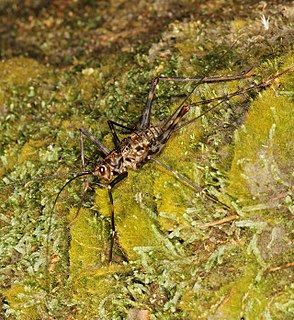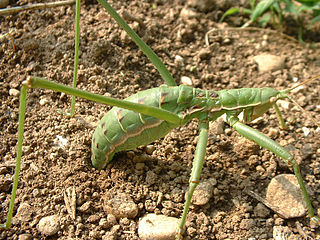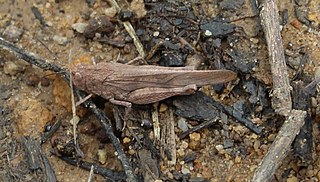
Anostostomatidae is a family of insects in the order Orthoptera, widely distributed in the southern hemisphere. It is named Mimnermidae or Henicidae in some taxonomies, and common names include king crickets in South Africa and wētā in New Zealand. Prominent members include the Parktown prawn of South Africa, and the giant wētā of New Zealand. The distribution of this family reflects a common ancestry before the fragmenting of Gondwana.

The family Gryllidae contains the subfamilies and genera which entomologists now term true crickets. They belong to the Orthopteran subfamily Ensifera, having long, whip-like antennae and has been reduced in terms of the older literature, with taxa such as the spider-crickets and allies, sword-tail crickets, wood or ground crickets and scaly crickets elevated to family level. The type genus is Gryllus and the first use of the family name "Gryllidae" was by Walker.

Cooloola is a genus of ensiferan orthopterans known as Cooloola monsters. It is the only genus in the subfamily Cooloolinae and family Cooloolidae of the superfamily Stenopelmatoidea.

Ensifera is a suborder of insects that includes the various types of crickets and their allies including: true crickets, camel crickets, bush crickets or katydids, grigs, weta and Cooloola monsters. This and the suborder Caelifera make up the order Orthoptera. Ensifera is believed to be a more ancient group than Caelifera, with its origins in the Carboniferous period, the split having occurred at the end of the Permian period. Unlike the Caelifera, the Ensifera contain numerous members that are partially carnivorous, feeding on other insects, as well as plants.

Tree crickets are insects of the order Orthoptera. These crickets are in the subfamily Oecanthinae of the family Gryllidae. This subfamily contains nine genera.

Tree wētā are wētā in the genus Hemideina of the family Anostostomatidae. The genus is endemic to New Zealand. There are seven species within the genus Hemideina, found throughout the country except lowland Otago and Southland. Because many tree wētā species are common and widespread they have been used extensively in studies of ecology and evolution.
Bienkotetrix is a genus of groundhoppers in the family Tetrigidae comprising, as of December 2018, only a single species, Bienkotetrix tibetanus. As its name suggests, it occurs in Tibet.

Trimerotropis is a genus of band-winged grasshoppers in the family Acrididae. There are at least 50 described species in Trimerotropis.

Gryllacrididae are a family of non-jumping insects in the suborder Ensifera occurring worldwide, known commonly as leaf-rolling crickets or raspy crickets. The family historically has been broadly defined to include what are presently several other families, such as Stenopelmatidae and Rhaphidophoridae, now considered separate. As presently defined, the family contains two subfamilies: Gryllacridinae and Hyperbaeninae. They are commonly wingless and nocturnal. In the daytime, most species rest in shelters made from folded leaves sewn with silk. Some species use silk to burrow in sand, earth or wood. Raspy crickets evolved the ability to produce silk independently from other insects, but their silk has many convergent features to silkworm silk, being made of long, repetitive proteins with an extended beta-sheet structure.

Phalangopsinae, occasionally known as spider crickets, are a subfamily of crickets in the family Phalangopsidae. Members of Phalangopsinae are found worldwide in tropical and subtropical regions. Most species in the subfamily are nocturnal and can be found in rocky areas, near fallen wood, and the understory of forests. Some species are gregarious, gathering in large numbers.

Gryllacridinae is an Orthopteran subfamily in the family Gryllacrididae.
Cosmophyllum is a genus of bush crickets in the subfamily Phaneropterinae. Species are found in Chile.

Saga is a genus of bush crickets or katydids containing around 15 species as of 2018. It is the only genus in the tribe Sagini and belongs to the subfamily Saginae. Species have been recorded from mainland Europe and western Asia.
The Tanaoceridae are an insect family in the monotypic superfamily Tanaoceroidea in the suborder Caelifera. They have been called desert long-horned grasshoppers.

Patanga is a genus of grasshoppers in the subfamily Cyrtacanthacridinae. Species are distributed throughout Asia: from India, China, Japan, Indo-China and western Malesia. The genus was named in 1923.

The Ommexechidae are a family of grasshoppers, in the Orthoptera: suborder Caelifera. Species in this family can be found in the Americas.

Tettigoniidea is an infraorder of the order Orthoptera, with six extant families.

Gryllidea is an infraorder that includes crickets and similar insects in the order Orthoptera. There are two superfamilies, and more than 6,000 described species in Gryllidea.

Erucius is a genus of grasshoppers in the family Chorotypidae. Species in this genus can be found in Vietnam and Malesia, including the Philippines. It is the only genus in the subfamily Eruciinae.

The Phalangopsidae are a recently reconstituted family of crickets, based on the type genus PhalangopsisServille, 1831 from South America. Priority for family-group names based on this genus dates from Blanchard's "Phalangopsites".















